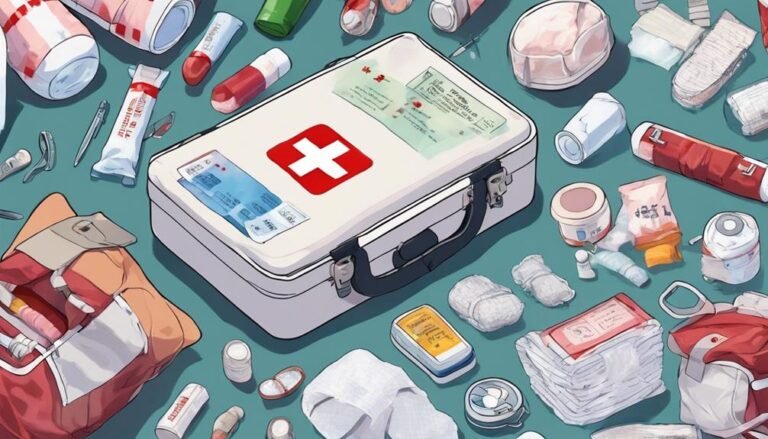How to Be More Prepared for Leadership Roles in Healthcare
Are you ready to take on the challenges of leadership in healthcare?
Understanding the intricacies of this dynamic field is essential, but what about honing your communication skills to effectively lead your team and navigate complex situations?
There's more to being a successful healthcare leader than meets the eye.
Stay tuned to discover essential strategies that will not only prepare you for the demanding role but also set you apart in the ever-evolving healthcare landscape.
Key Takeaways
- Develop strong communication skills through active listening and assertiveness training.
- Embrace continuous learning to enhance leadership qualities and navigate healthcare complexities effectively.
- Engage in skills development opportunities like workshops and certifications to expand knowledge and improve competencies.
- Prioritize team building, regulatory compliance, and strategic mindset to excel in healthcare leadership roles.
Understanding Leadership in Healthcare
Understanding leadership in healthcare requires a deep comprehension of the unique challenges and complexities that arise within the dynamic healthcare environment. To excel in leadership roles within the healthcare sector, it's essential to possess key leadership qualities such as effective communication, adaptability, and a strategic mindset. Healthcare challenges, including rising costs, evolving regulations, and the constant need for innovation, demand leaders who can navigate these obstacles with resilience and foresight.
Leadership qualities such as empathy and the ability to inspire and motivate others are critical in fostering a positive work culture and driving team success in healthcare settings. Additionally, strong decision-making skills and the capacity to prioritize patient care amidst competing demands are necessary for effective healthcare leadership.
Developing Key Communication Skills
To excel in healthcare leadership roles, developing key communication skills is imperative for effectively conveying vision, fostering collaboration, and driving organizational success. Communication isn't just about speaking; it's about actively listening, understanding, and responding appropriately. Here are three essential aspects to focus on:
- Active Listening: Mastering the art of active listening involves giving full attention to the speaker, understanding their message, and providing feedback to guarantee clarity and alignment. This skill is critical for building trust and rapport with team members, patients, and stakeholders.
- Assertiveness Training: Being assertive means expressing your thoughts, needs, and concerns clearly and confidently while respecting the opinions of others. Assertiveness training can help you navigate difficult conversations, make decisions effectively, and establish boundaries in a professional manner.
- Conflict Resolution and Emotional Intelligence: Conflict is inevitable in any workplace, but how you manage and resolve it can make a significant impact on team dynamics and overall performance. Developing emotional intelligence allows you to understand and regulate your emotions, empathize with others, and navigate conflicts with tact and empathy.
Embracing Continuous Learning and Growth
To excel in healthcare leadership roles, you must adopt a mindset of continuous learning and growth. Seek out opportunities to develop your skills and knowledge throughout your career.
Embracing this philosophy won't only benefit you personally but also enhance the quality of care you provide to patients.
Lifelong Learning Mindset
Embracing a lifelong learning mindset is essential for healthcare leaders to stay adaptable and continuously grow in their roles. This approach fosters a growth mindset and encourages ongoing professional development. Here are three key reasons why adopting a lifelong learning mindset is critical for healthcare leaders:
- Adaptability: Continuous learning allows you to adapt to the ever-evolving healthcare landscape, ensuring you can navigate changes effectively.
- Innovation: By consistently expanding your knowledge base, you can bring fresh ideas and innovative solutions to complex healthcare challenges.
- Leadership Development: Lifelong learning enhances your leadership skills, enabling you to inspire and guide your team effectively towards achieving common goals.
Incorporating a commitment to lifelong learning won't only benefit your personal growth but also positively impact the healthcare organization you lead.
Skills Development Opportunities
Shifting from a focus on a lifelong learning mindset, the next step in your healthcare leadership journey involves seizing skills development opportunities to foster continuous learning and growth. To enhance your leadership capabilities, consider engaging in leadership workshops and networking events to learn from industry experts and expand your professional circle. Additionally, attending skill-building seminars and obtaining relevant certifications can equip you with the necessary tools to excel in leadership roles within the healthcare sector. By actively seeking out these opportunities, you demonstrate a commitment to personal and professional growth, positioning yourself as a proactive and capable leader in the ever-evolving healthcare landscape.
| Opportunities | Description | Benefits |
|---|---|---|
| Leadership Workshops | Interactive sessions led by experts | Enhanced leadership skills and knowledge |
| Networking | Building connections with industry peers | Access to new perspectives and opportunities |
| Skill Building Seminars | Targeted training to develop specific skills | Improved competencies in key areas |
| Certifications | Formal recognition of expertise | Increased credibility and career advancement |
Building Strong Team Relationships
Developing strong team relationships is crucial for effective healthcare leadership, fostering collaboration and enhancing overall performance. To excel in this area, consider the following key strategies:
- Open Communication: Encourage a culture where team members feel comfortable sharing ideas, concerns, and feedback. Effective communication builds trust and promotes a sense of unity within the team.
- Team Building Activities: Engage in activities that promote camaraderie and teamwork outside of work responsibilities. This can help break down barriers, improve relationships, and create a more cohesive team.
- Recognition and Appreciation: Acknowledge the hard work and contributions of team members regularly. Recognizing their efforts not only boosts morale but also fosters a positive work environment where individuals feel valued and motivated.
Navigating Healthcare Regulations and Compliance
To effectively lead in healthcare, understanding and maneuvering intricate regulations and compliance requirements is imperative for ensuring the delivery of high-quality care and maintaining organizational integrity. The compliance challenges within the healthcare industry are multifaceted, ranging from stringent data protection laws to billing and coding regulations. Leaders must stay abreast of the dynamic regulatory landscape to mitigate risks and avoid potential penalties. Developing a robust compliance framework that aligns with industry standards and best practices is essential for fostering a culture of accountability and ethical behavior within the organization.
Exploring healthcare regulations requires a strategic approach that involves proactive monitoring, regular audits, and continuous staff training. By proactively addressing compliance challenges, leaders can uphold ethical standards, minimize legal liabilities, and enhance patient trust. Understanding the regulatory landscape enables leaders to adapt swiftly to changes, implement necessary adjustments, and maintain operational efficiency. Embracing compliance as a cornerstone of organizational culture not only guarantees legal adherence but also promotes a reputation of reliability and excellence in healthcare delivery.
Fostering a Culture of Innovation
To excel in healthcare leadership, you must champion creative problem-solving to tackle complex issues efficiently.
Encouraging new ideas from your team can spark innovation and lead to groundbreaking solutions.
Embracing a change mindset is essential for fostering a culture of innovation that drives continuous improvement in healthcare practices.
Promoting Creative Problem-Solving
Fostering a culture of innovation within healthcare leadership roles requires a proactive approach to promoting creative problem-solving. To enhance this culture, consider the following:
- Implement problem-solving techniques: Encourage team collaboration by organizing brainstorming sessions and workshops to tackle complex issues collectively.
- Foster critical thinking: Encourage a mindset that challenges assumptions and seeks alternative perspectives to drive innovation strategies within the organization.
- Cultivate innovation strategies: Provide resources and support for experimenting with new ideas, technologies, and processes to continually improve and adapt to the evolving healthcare landscape.
Encouraging New Ideas
Encouraging a culture of innovation within healthcare leadership involves actively seeking and nurturing new ideas to drive organizational growth and adaptation. To foster this environment, engaging in brainstorming sessions and promoting idea generation is essential. This encourages innovative thinking and creativity promotion among team members. By embracing new ideas, healthcare leaders can stay ahead in a constantly evolving industry.
| Benefits of Encouraging New Ideas | ||
|---|---|---|
| 1. Sparks creativity | 2. Enhances problem-solving skills | 3. Improves patient care |
| 4. Fosters teamwork | 5. Drives organizational progress |
Embracing Change Mindset
Embracing a change mindset within healthcare leadership is essential for fostering a culture of innovation and adaptability in today's dynamic industry landscape. To truly embrace change and drive innovation, consider the following:
- Change Readiness: Encourage your team to be proactive in anticipating and adapting to changes in the healthcare environment.
- Adaptability: Cultivate a transformation mindset that values flexibility and the ability to pivot quickly in response to new challenges.
- Continuous Learning: Emphasize the importance of ongoing education and professional development to equip your team with the skills needed to thrive in a rapidly evolving healthcare landscape.
Prioritizing Self-Care and Well-Being
How can healthcare leaders guarantee their effectiveness and longevity in their roles without neglecting their own well-being and self-care needs? Prioritizing self-care and well-being is essential for leaders in the healthcare sector to maintain peak performance and make sound decisions. Mental health and stress management play pivotal roles in ensuring leaders can navigate challenges effectively.
To excel in leadership roles, healthcare professionals must prioritize self-care practices. Engaging in activities that promote mental health, such as mindfulness exercises or seeking therapy when needed, is vital. Additionally, effective stress management techniques like time management strategies and regular exercise can help leaders maintain a healthy work-life balance.
| Self-Care Strategies | Description |
|---|---|
| Mindfulness Exercises | Practices to enhance mental focus |
| Therapy Sessions | Professional support for mental well-being |
| Time Management | Techniques to optimize productivity |
| Regular Exercise | Physical activities for stress relief |
Conclusion
To wrap up, preparing for leadership roles in healthcare requires a multifaceted approach. Did you know that 73% of healthcare executives believe that leadership development is a top priority for their organizations?
By understanding the complexities of healthcare, honing communication skills, fostering team relationships, staying up-to-date on regulations, promoting innovation, and prioritizing self-care, you can position yourself for success in a leadership role.
Remember, continuous learning and growth are key to excelling in the dynamic field of healthcare leadership.







